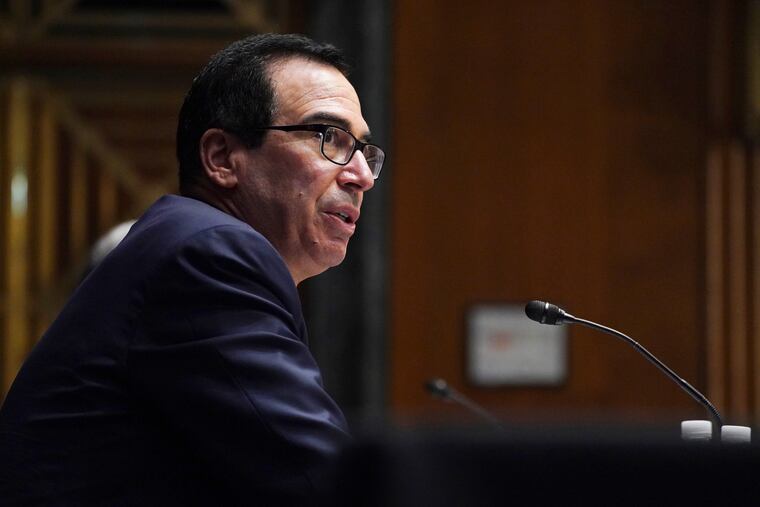Treasury Secretary Steven Mnuchin sees one more chance for a stimulus package, as the House readies a vote
Mnuchin suggested he'll offer Democrats a proposal for roughly $1.5 trillion in pandemic relief.

U.S. Treasury Secretary Steven Mnuchin said he sees “one more serious try” at securing a deal with Congress on another fiscal stimulus package and suggested he’ll offer Democrats a proposal for roughly $1.5 trillion in pandemic relief.
Mnuchin said Wednesday on CNBC that the administration’s counteroffer to House Speaker Nancy Pelosi is similar to a plan put forward by a bipartisan group of House members — which included an escalation in spending up to $2 trillion if the coronavirus pandemic persists. That’s still short of a $2.2 trillion relief package that Democrats unveiled Monday and are preparing to bring to a House vote.
Mnuchin said he hopes to have an "understanding" worked out by Thursday.
Pelosi has asked Democrats to deliver a "strong vote" for the party's latest package, which is smaller than the $3.4 trillion they passed in May but rejected by Republicans. In a letter to colleagues, she described it a "proffer" in talks. House Majority Leader Steny Hoyer told fellow Democrats Wednesday his intention is to send the bill to the floor Wednesday or Thursday if there is no deal with Mnuchin.
Mnuchin and Pelosi will talk Wednesday afternoon, the Treasury chief said. Renewed optimism on the potential for a compromise saw U.S. stocks open to gains, after futures had earlier tipped another down day.
"Whether we get this fiscal deal done or we don't, I am confident we will continue to have economic growth and rebound," Mnuchin said. "I'm confident we can get something done, and if we don't, we will come back and work on it after the election."
» READ MORE: Coronavirus cuts hit the classroom: Rutgers eliminates some adjunct positions
He also underscored that more support for airlines is critical, as carriers face the risk of a wave of layoffs. Mnuchin said that he doesn't expect a stand-alone bill for airline aid, and that he'll update top executives on the talks after he confers with Pelosi.
The negotiations between the Trump administration and congressional Democrats are at a critical juncture. Either Pelosi can cut a deal with the White House or the Democratic-led House will vote on her $2.2 trillion plan without Republican support, allowing members leave town for preelection campaigning.
If no deal is reached, Democrats could vote by Thursday. Timing will depend on the result of Pelosi's talks with Mnuchin. House Republican leaders have already rejected the proposal.
While the legislative text adds clarity to the Democratic offer, the top-line spending level is no closer to what Republicans say they'll support. President Donald Trump has indicated he could agree to as much as $1.5 trillion in aid — but even that is more than the $650 billion put forth in a "skinny" aid package by Senate Republicans earlier this month.
Officials in both parties privately questioned whether the differences could be bridged. Pessimism about reaching a deal was one of the factors that helped push stocks lower on Tuesday. Private economists have increasingly abandoned predictions for a deal before the election. JPMorgan Chase and Goldman Sachs recently cut their forecasts for growth next quarter as a consequence.
The negotiations have been at an impasse since August. Pelosi on Tuesday continued to say she is hopeful that an agreement can be reached. "We're in a negotiation and hopefully we will come to a bipartisan agreement," she said on MSNBC after talking with Mnuchin.
Yet Pelosi said on MSNBC that GOP resistance to rolling back tax breaks in the March stimulus has proven to be an obstacle. The bill contained tax breaks used by real estate businesses; the housing sector has since boomed thanks to record-low mortgage rates.
Republicans continue to oppose the scale of spending Democrats favor. White House economic adviser Larry Kudlow, speaking on CNBC Tuesday morning, said the true cost of the Democrats' bill is closer to $2.6 trillion and about one-third of it is related to subjects that Republicans don't believe are strictly tied to the pandemic.
"For some reason, we just can't get it done, but the conversation, the talks will continue," Kudlow said. "The other team wants a gigantic package and we don't think we need that."
Pelosi said the much of the difference between the May House plan and the latest proposal is the length of time many of the provisions would be in effect.
"We didn't take out priorities," she said. "We just reduced the timeline as to how long those benefits would last."
A key point of disagreement has been the Democrats' push for large-scale aid to state and local governments. The plan released Monday has $436 billion for one year of assistance — less than a previous demand for $915 billion, which triggered scorn from Trump administration officials who called it a bailout for poorly run states.
The Democratic plan includes new aid for airlines, restaurants and small businesses that wasn't in the original House package, and it has more than double the amount for schools.
The bill would provide another round of $1,200 direct relief payments to individuals and $500 per dependent — less than the $1,200 for dependents Democrats originally proposed. It also has $600 per week in extra unemployment benefits through January, the same amount that expired in July and helped disposable incomes surge even as the economy tipped into recession.
With the Senate under Republican control, and its leaders now preoccupied with the president's nomination of Judge Amy Coney Barrett to the Supreme Court, the bill is unlikely to advance absent a major push from the Trump administration.
______
Bloomberg’s Josh Wingrove contributed to this report.